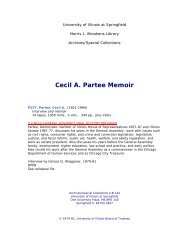harold a. katz memoir volume 1 - University of Illinois Springfield
harold a. katz memoir volume 1 - University of Illinois Springfield
harold a. katz memoir volume 1 - University of Illinois Springfield
Create successful ePaper yourself
Turn your PDF publications into a flip-book with our unique Google optimized e-Paper software.
white suit with a conservative tie. I identified myself to a guard at the gate and was given<br />
immediate clearance to enter the grounds. Mrs. Roosevelt received me in a second floor<br />
waiting room.<br />
We were soon escorted to a veranda overlooking the White House lawn. Alice Longworth<br />
Roosevelt was at tea that day. And so was Barbara Ward Jackson, the editor <strong>of</strong> the London<br />
Economist. It was very exciting for me. I occasionally interjected some comments in that<br />
distinguished company. Mrs. Roosevelt would invariably ask, "What did you say?" or some-<br />
thing like that. I assumed it was due to my southern accent. I discovered subsequently<br />
that she had one good ear and one bad ear. It was my misfortune to sit on the wrong side<br />
<strong>of</strong> Mrs. Roosevelt. So, if I'd sat on the other side, I could probably tell you that I had a<br />
stimulating back-and-forth conversation with her. But sitting on the wrong side, she didn't<br />
seem to hear what I had to say. But it was very fascinating to me to be able to move even<br />
on the outer perimeter <strong>of</strong> such a distinguished group. Thereafter, I maintained occasional<br />
contact with Mrs. Roosevelt.<br />
Q: Did you meet the president?<br />
A: I didn't. Of course, when I was at Campobello in 1942, we lived in the Roosevelt home,<br />
an 18-bedroom cottage where Franklin and Eleanor spent nearly every summer from 1909<br />
until 1921, when polio struck. We saw the boat that Roosevelt had been out in that fateful<br />
day. It was still in the boathouse.<br />
The Roosevelt cottage is now part <strong>of</strong> the Roosevelt Campobello International Park, run by<br />
the US. and Canada. Electricity, telephones, and a causeway to the mainland have been<br />
added since I lived there in July and August <strong>of</strong> 1942.<br />
Q: What did you do?<br />
A: Faculty members from major universities would come down and spend a week with<br />
us. It was a four-week seminar, and there would be an eminent faculty member for each<br />
<strong>of</strong> the four weeks. Mrs. Roosevelt also was there during some <strong>of</strong> the time. We would<br />
engage in discussion <strong>of</strong> different social, political, economic problems <strong>of</strong> the society. And the<br />
faculty person would speak.<br />
Our first speaker was the president <strong>of</strong> Hunter College in New York, George N. Shuster, a<br />
distinguished Catholic layman. This was a period when young liberals were unhappy with<br />
what was going on in Spain where Franco was annihilating the democratic segment <strong>of</strong> the<br />
country. When Dr. Shuster finished talking to us and opened a question period, one young<br />
man from New York, one <strong>of</strong> the students who had just been waiting to throw something<br />
at him about the church and its iniquitous position on Spain, jumped up and said, "I have<br />
a question. As a liberal Catholic - " President Shuster stopped him right there. He said,<br />
"Young man, I am a Catholic liberal. There is no such thing as a liberal Catholic." The<br />
years have changed all that. Today there is such a thing as a liberal Catholic, a Catholic<br />
who refuses to accept the church position on a matter <strong>of</strong> theology or dogma. But at that<br />
time, the very beginning <strong>of</strong> the 1940's, even outstanding liberal persons <strong>of</strong> the Catholic faith<br />
made it very clear that they were not liberal Catholics, that they were Catholic, period, and<br />
they were liberal, period.<br />
Q: Do you remember any participation <strong>of</strong> your own in question periods or anything?<br />
A: No, I said nothing memorable. All <strong>of</strong> the students who went there were very interested<br />
in current events, world affairs, problems <strong>of</strong> the nation, that's why they went there. It did<br />
afford an opportunity for students to meet with other students who were more like them. At<br />
Vanderbilt I was outside <strong>of</strong> the mainstream. At Campobello I was in the mainstream. That<br />
in itself was useful to know. There was a world with other people who were like me. If

















